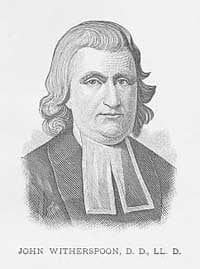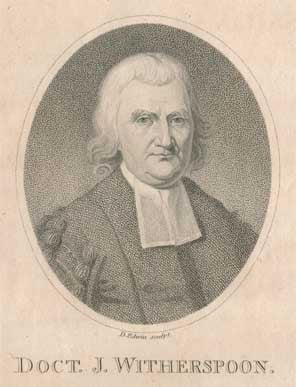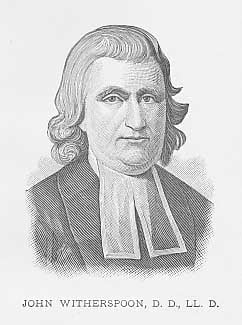You would have thought that he was a king making a royal entrance into his kingdom, so great was the rejoicing among God’s people to his arrival on the shores of the American colonies. And indeed, John Witherspoon was certainly the man whom God has chosen to lead the infant College of New Jersey in its next steps of Christian education.
The College had some dark providences associated with its leadership. In the twenty years of its existence, the five leaders who served as its president, had served a few years and then died. In fact, it was this mortality rate which cause Mrs. Elizabeth Witherspoon, John’s wife in Scotland, to want nothing to do with the College. And so there had been four appeals to come over and help them, but all four of them failed to move the Scotchman, but more particularly the Scotch woman to wish to cross over the Atlantic. Finally, with the aid of Benjamin Rush, who at that time was studying for a medical degree in Edinburgh, Mrs. Witherspoon was convinced that they should go. Despite the three-month crossing of the Atlantic Ocean in a sailing ship named the Peggy, with five children, and three hundred books for the College library might make anyone rethink the invitation, they did not. On August 7, 1768, the family arrived in Philadelphia, Pennsylvania.
Dr. David Calhoun, in his book “Princeton Seminary: Faith and Learning, 1812 – 1868,” describes John Witherspoon who stepped off the ship as being “a heavy-set man of forty-six, with brown hair, a strong face with large nose and ears, and blue eyes which looked out beneath bushy brows.”
Resting for five days in the city of Philadelphia, and who can blame them for that after such an ocean voyage, they traveled on to the town of Princeton, New Jersey in a horse and carriage. About a mile from the town, the entire student body of one hundred and twenty students, with the staff, met them and ushered them into the town and onto the campus. His family had use of a house, a garden, land for pasture, and firewood. There was an annual salary equal to 206 pounds sterling. That night, in every window of Nassau Hall, there was a candle which illuminated the building. The future Princeton University and Seminary were rejoicing over his safe arrival.
John Witherspoon was installed as the sixth president of the College of New Jersey on August 17, 1768. And, he was stand the test of time for decade, as well as through some of the most difficult days in the history of America. John Witherspoon would make his mark for God’s glory during all this time.
Also this day:
The Advisory Convention was held August 7-9, 1973, to set down final preparations for the First General Assembly of what was to become the Presbyterian Church in America, when that Assembly met December 4-7, 1973.
Words to live by: The Scots-Irish Presbyterians of the colonies knew what they had to have when they invited John Witherspoon. A strong advocate of the doctrines of the Westminster Standards, he had stood for the faith once delivered unto the saints in Scotland. He was an accomplished preacher, church leader, and an author. When a church leader has been bestowed Spirit-given abilities for service, or spiritual gifts, then much good for the saints is expected. When God’s glory is aimed at by that same leader, then much good for the kingdom of God is attained. Pray that God will sovereignly bestow His gifts upon the church at large, and your church in particular.
Witherspoon’s works have been largely overlooked and forgotten for some time now, or so it seems. Thankfully, however, his works have been reprinted in recent years. See the end of this post for a small taste of Dr. Witherspoon’s writing.


![Ashbel Green [1762-1848]](https://thisday.pcahistory.org/wp-content/uploads/2013/07/Dr.-Ashbel-Green-217x300.jpg)


